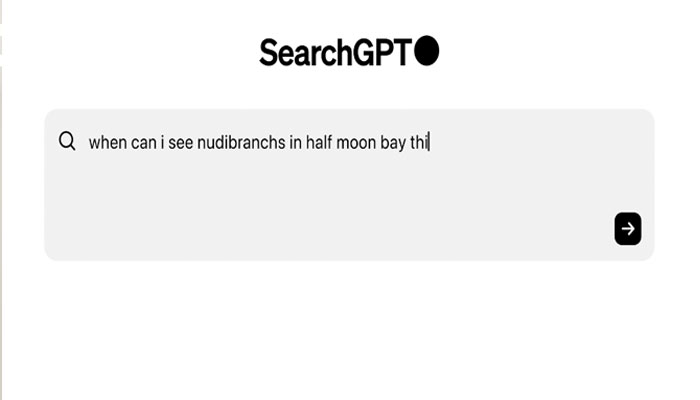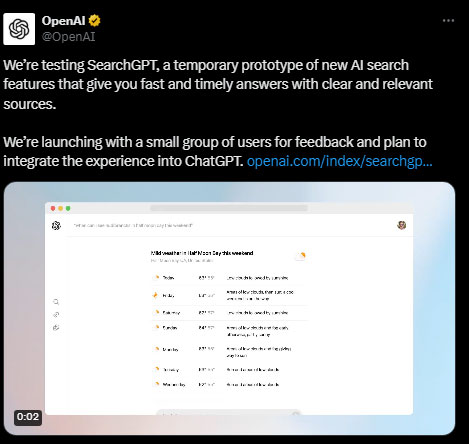
OpenAI unveiled its plan to launch SearchGPT — an artificial intelligence (AI) powered search engine with real-time access to internet-based information — which could be a major threat for Google and AI rival Perplexity.
The prototype of SearchGPT looks like a large textbox that asks: "What are you looking for?" Unlike traditional search engines like Google, SearchGPT doesn't return pages of links. Instead, it organises the information and provides summaries.
In an example shared by OpenAI on its official webpage, SearchGPT summarises a query about music festivals, offering short descriptions of various festivals along with an attribution link. A sidebar with other relevant links also appears, providing access to additional information.
Another example involves planting tomatoes, where the search explains the best time to plant and details different tomato varieties. Users can submit follow-up queries in the search bar at the bottom of the page.
Powered by the GPT-4 family of AI models, OpenAI aims to eventually "integrate the best of these features directly into ChatGPT in the future."
With the emergence of SearchGPT and Perplexity, Google faces new competition in the search realm. Google's recent attempts to incorporate AI into search results have not gone smoothly. After introducing AI Overviews during their annual I/O event in May, the tool faced massive backlash due to providing dangerous and incorrect information. Despite these issues, Google continues to test generative AI in Search.

Google's missteps haven't gone unnoticed. The company's AI tools are still in development, but OpenAI's announcement has increased pressure. Google's parent company, Alphabet, saw its stock dip following OpenAI's news, as reported by CNBC.
Meanwhile, a Wired investigation revealed that Perplexity has been accused of stealing content or fabricating information, with Forbes threatening legal action against the AI company.
OpenAI appears to be aware of these challenges and has taken steps to avoid similar issues. In its blog post announcement, OpenAI emphasised that SearchGPT is developed in collaboration with publishers like The Atlantic and News Corp.
"SearchGPT is designed to help users connect with publishers by prominently citing and linking to them in searches," the post states. "Responses have clear, in-line, named attribution and links so users know where information is coming from and can quickly engage with even more results in a sidebar with source links."
Publishers like The Wall Street Journal and Associated Press can control how their work appears in the service. OpenAI assures that SearchGPT is separate from the training used on generative AI models like ChatGPT.
These measures seem intended to help OpenAI avoid the controversial missteps made by Google and Perplexity.
Rumours of OpenAI working on a search engine have been circulating since at least February. Many expected OpenAI to release a new search engine before Google's I/O event, but instead, they unveiled the powerful GPT-4 model, which also had its controversies.
SearchGPT is currently free and may remain free upon full public release. However, OpenAI's operating costs are rising, with The Information reporting that the company could lose $4 billion just in renting Microsoft servers to power ChatGPT.
This may explain why OpenAI has entered into more partnerships, including those with publishers and manufacturers like Apple.
SearchGPT is being tested by around 10,000 users, and those interested can sign up for a waitlist to try OpenAI's version of a search engine.
















